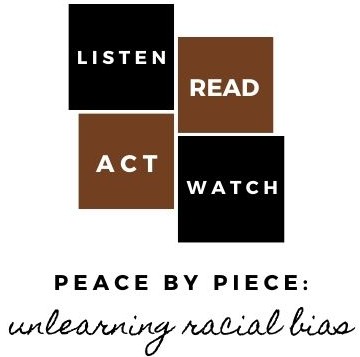This post is part of a year-long series. If my work is helpful for you, consider a contribution through Venmo to support this crucial work of unlearning racial bias.
When my sons were busy toddlers, taking them into stores with me often felt like a chore. And yet, on occasion, it would make more sense to bring them with me for errand running than to wait for the end of my husband’s workday to hand them off so I could go to the store solo. When the boys were along for the weekly grocery run, they’d frequently notice and then subsequently check for certain objects, in that pattern-seeking way that children have. While I waited for groceries to be rung up and bagged, they would look at the Coinstar machine, beg quarters for the trinkets and stuffed animals piled into claw and vending machines, and they’d take long sips from the water fountain.

This was a particular fascination for each of them: seeking out and making use of water fountains when we’d be in stores or at parks. Even if I’d brought along their water bottles or indulged them by purchasing juice boxes for a special treat, they would nonetheless locate the water fountain – if one was available – and trot over to make use of it, analyzing the water’s temperature and flow as they did so. Frequently, when I’d pause to watch them partake, I would utter a silent prayer of thanks to God that this water was available to them. I carried with me the knowledge that had our family unit existed just a few decades earlier, my children’s natural fascination with and affinity for public water fountains, would have been completely unwelcome. “Whites only” signs and fabricated yet widely accepted beliefs that Black people carried and spread different diseases than white people would have ensured that my children’s thirst to partake of public water fountains remained unquenched.
I think, too, about how water appears in the Bible – from the cleansing flood that preceded global renewal while Noah’s family and a menagerie of animals floated safely in the ark, to the humble River Jordan made holy by Christ’s baptism. Water acts as an origin story of spiritual life when Jesus performs his first public miracle, and again when a woman meets Jesus at a well. If I stretch my imagination, I can even see children being welcomed by Jesus as a representation of what I’ve witnessed with my sons: little children will always look for water – for routine, for security, for connection, for life. Perhaps little children were drawn to Jesus because they knew he was their first cause, their source, their origin. Perhaps they knew Jesus embodied the source from which all life flows and is sustained. Although He did not draw children unto himself by extending literal cups of water to them, perhaps children sensed the living water He was and is and ever shall be.
This week, I hope you’ll listen to a collection of songs about water: this week’s suggested resource. As you listen, I hope you’ll reflect on water – how it nourishes and sustains us; how rain can hide our sorrowful tears or wash dirt away from unclean hands; how we access water, and with whom we choose to share it.
- When you think of water, what image or description comes to your mind first?
- What is your earliest memory of water? What were you doing? How did you feel?
- Has your perspective on water changed over time? How? What happened in your life to lead to this change in perspective?
- When you think of water – falling from the sky, making waves in the ocean, splashing in a pool, or filling a glass – who is sharing the water with you? Who are you sharing the water with? How might the presence of those people in and near the water form your perception of water’s purpose and importance?
I hope that as you listen to these songs about water, that you will consider its purpose and presence in our lives. If we let it, could water wash away the racial biases we’ve learned, leaving us refreshed and ready to see clearly, with new eyes?
Meet me back here again next week, and we will keep unlearning racial bias to build a more peaceful world, one piece at a time.

